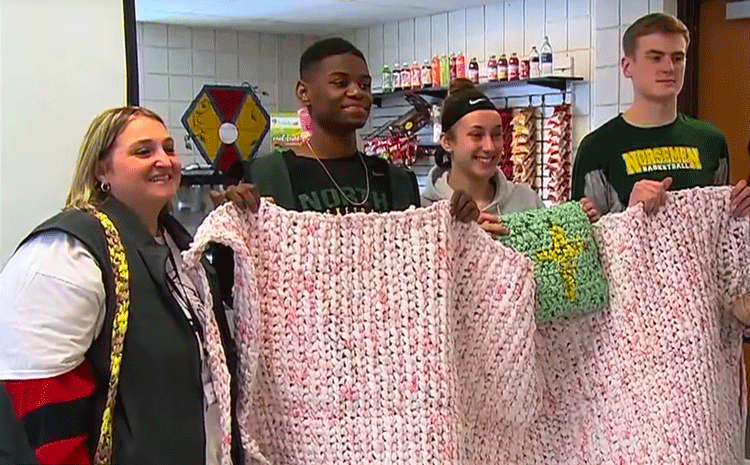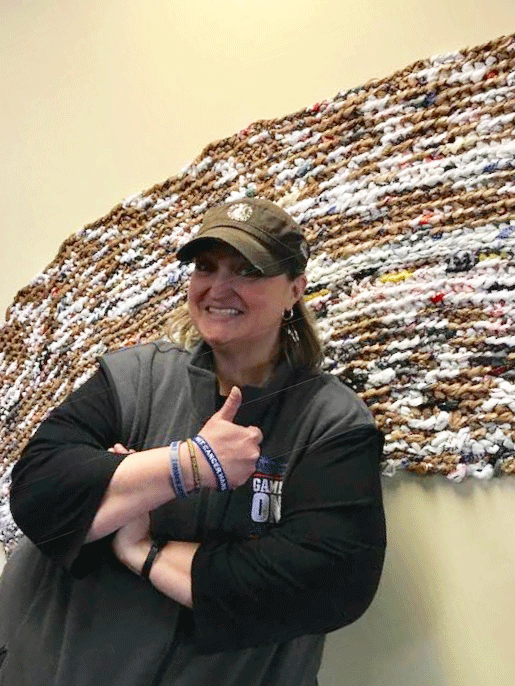
From Shantytown to Motown: Alum devotes life to helping the homeless
Jul 23, 2020
In the early 1990s, when Gail Marlow was a sophomore music major at Xavier University, she made a little house out of cardboard, painted it red, and dragged her comforter, pillow and blankets inside. Surrounded by other students in their makeshift huts on Xavier’s Academic Mall, she went inside and stayed for about a week, going to class and the cafeteria despite several days of rain that soaked her socks and her bedding.
She remembers feeling miserable while sitting by herself inside her box. “I didn’t stay clean and I ended up skipping a couple of classes. It was hard to function,” she said.
But despite the misery, or perhaps because of it, the experience made a permanent impact on Marlow, so much so that two years ago, she started a non-profit dedicated to helping people struggling with homelessness and food insecurity in her home town of Grosse Pointe near Detroit. It’s called the Motor City Mitten Mission, and as it’s grown in numbers served and dollars raised, it’s drawn the attention of local and national media, including a recent visit by National Geographic.
For Marlow, helping the homeless has become her life’s work—a seed that was planted by her parents and nourished by Xavier. “Xavier was very inspirational in me continuing on that path,” she said.
“My main takeaway was that there are people out there that live like this. I remember feeling this guilt of being able to still go inside and still have food to eat and not worry about it, and you sit there by yourself and you think it’s a novelty because you know there is going to be an end to Shantytown, but to someone who is homeless, there is this uncertainty you don’t know what is going to happen.”
For two years, Marlow participated in Shantytown, an annual tradition when Xavier students built shelters out of wood, cardboard and other materials on the Academic Mall to raise awareness about homelessness in the U.S. It was a logical extension of her family’s emphasis on volunteerism and serving others, but she didn’t realize how deeply embedded her commitment to combating homelessness would become until years later, long after graduating in 1997, when she returned to Grosse Pointe to care for her ailing grandmother.
Unsure what to do after her grandmother died in 2011, Marlow turned back to volunteering. That morphed into consulting for a poor community in Detroit, which led to work for another social service organization where she became friends with a teacher, and together they started Motor City Mitten Mission.
“My mission from the very beginning was to create change for people who are housing and food insecure and not just put a band-aid on it,” she said.
Their first project was using recycled grocery bags to make sleeping mats and pillows to give to people on the streets. Marlow remembered stuffing garbage bags around her leaking shanty at Xavier to keep the water at bay and knew how important it is to stay dry when you’re living outside.
So she began “plarning,” which is when you cut and tie plastic grocery bags together and create a yarn-like product that can be woven into mats, blankets and pillows. They provide a barrier between the ground and the body, they keep out water and bugs, and they’re soft, portable and reusable.
 Since its start as a non-profit in late 2017, Motor City Mitten Mission has grown by 300 percent in volunteer hours, funds raised and people served. Last year they raised over $100,000 cash and $250,000 of in-kind contributions—all private donations—and performed over 60,000 volunteer hours serving about 1,500 people a week.
Since its start as a non-profit in late 2017, Motor City Mitten Mission has grown by 300 percent in volunteer hours, funds raised and people served. Last year they raised over $100,000 cash and $250,000 of in-kind contributions—all private donations—and performed over 60,000 volunteer hours serving about 1,500 people a week.
“We are like the meals-on-wheels for the homeless,” she quipped.
Their mission is three-fold: the mats and pillows project, a street outreach program that delivers meals and supplies daily to people living outside, and a transitional services program to help individuals and families move into housing or support them once they are housed.
Her long-term goal is to expand the mission into a center that provides a full-service program of support for transitional housing, job skills training and mental health or substance abuse treatment, while still ministering to those on the streets.
For now, as the executive director, she and her board focus on finding and helping volunteers to make the mats and pillows, collecting rescued food and preparing it into individual meals that are delivered by teams of volunteers, and helping those in transitional housing—motels, shelters, apartments—find furniture and supplies for their new homes. She also works on fund-raising and building relationships with businesses, police and city officials.
Many of her volunteers are people she has helped when they were homeless. “I have three guys right now, young men who are all successes, staying clean, and they come to work and volunteer and go out with me and do outreach every day,” she said.
She said it’s important to treat everyone they encounter with dignity.
“We make sure all our donations are in good condition and all the food we give out we make sure it’s food we would eat ourselves. My hope is if one of these guys cleans up and is able to get one of these people off the street, then that’s one more person who can make a difference,” she said. “There are people who we give them a meal and they start crying.”
Their slogan is, “It’s easy to be kind. Together we can make a difference.”
“The mats and recycling bags is how we got started, but what we do now is so much more than that,” she said. “For the first month of the pandemic, we were the only outreach team working with homeless and unsheltered people bringing them food and checking them for COVID and getting them into shelter every day.”
Her work around Detroit has drawn the attention of local news outlets, including Detroit station WXYZ-TV Channel 7 during a winter storm, and her community paper in Grosse Pointe.
More recently, a team from National Geographic followed her staff on their daily routes to deliver food to people living outside. She hopes their story helps spread information about how the pandemic has increased the number of people without housing.
“I always say all of us are only a step away from becoming homeless, and the irony of the pandemic is that there are so many people who thought they were immune from ever being in the situation they are in now,” she said. “This is what the people we service deal with every day, and I think nobody is immune to that situation.”
But she is also encouraged by how much her organization has grown. It gives her hope that more people—like those she built shanties with at Xavier—will step up in response to the need.
“I think everything I do in my life is living the Xavier mission,” she said. “At Xavier there is definitely more compassion, and that is one of the things I learned at Xavier is having compassion for others and being somewhat selfless in what you do and how you live your life. I’m so proud to be a Xavier alum.”
Learn more about Motor City Mitten Mission.
Learn how to make mats and pillows from grocery bags.
By France Sloat, Office of Marketing and Communications